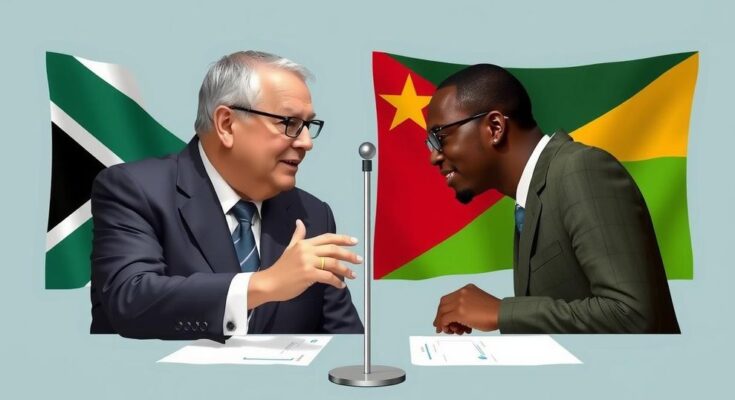Senior officials from South Africa and Mozambique engaged in talks on Wednesday to address rising tensions over disputed election results, primarily sparked by opposition leader Venancio Mondlane. With protests escalating and fears of violence increasing, the outcome of the Constitutional Council’s confirmation of results is pivotal for regional stability.
On Wednesday, high-ranking officials from South Africa convened with their Mozambican counterparts to address escalating tensions surrounding the disputed outcomes of Mozambique’s recent elections. The South African delegation included Foreign Minister Ronald Lamola and representatives from various sectors, including police and defense. The discussions took place in Malelane, situated approximately 50 kilometers from the border, as the stability of the region hangs in the balance following reported violence and unrest following the October elections.
Mozambique is poised for a pivotal announcement from its Constitutional Council regarding the ratification of the October 9 election results, which have faced outright rejection from the opposition. Opposition leader Venancio Mondlane has incited his followers to escalate protests should the council back the electoral commission’s declaration of results, which showed a stark difference in support between him and the ruling Frelimo party. Concerns have been raised about potential civil disorder as Mondlane threatened to unleash chaos in the streets if the official results stand.
The tension has resulted in widespread demonstrations that have critically halted activities in urban centers, disrupted services at power plants, impeded operations in mining, and obstructed traffic at key border points with South Africa, which is detrimental to trade. Recent reports confirm that approximately 130 individuals have lost their lives amid the unrest, prompting international scrutiny about the legitimacy of the electoral processes. Despite the turmoil, Mondlane asserts his version of the results, claiming a majority with 53 percent support, contrasting sharply with the Frelimo candidate’s alleged 36 percent. International observers have noted that these elections were plagued with irregularities, further complicating the political landscape.
The recent elections in Mozambique have been marred by significant controversy, primarily concerning allegations of vote manipulation and fragmentation of political stability within the country. The ruling Frelimo party has been under scrutiny for overseeing a process that many observers believe was flawed. Tensions have mounted further with opposition parties, particularly led by Venancio Mondlane, who argues that the election results do not reflect the will of the people and urges his supporters towards unrest should their claims not be recognized. The backdrop of these events includes a history of political violence in Mozambique, raising alarms for regional stability.
This development emphasizes the precarious nature of political stability in Mozambique and its implications for regional partnership and security. As South Africa’s involvement indicates, the potential for violence necessitates diplomatic engagement to mitigate further unrest that could spill over national borders. The coming decision from the Constitutional Council will be pivotal in either calming the ongoing tensions or exacerbating them, posing significant risks to Mozambican society.
Original Source: www.barrons.com




